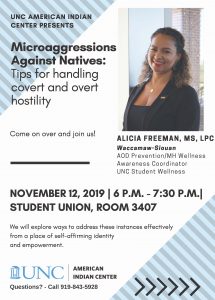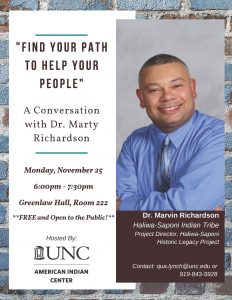Native Pathways to Professional Development
Native Pathways to Professional Development
The UNC American Indian Center will host a series of workshops each academic year that are geared toward enhancing professional development skills amongst current American Indian Students attending UNC-Chapel Hill. Each workshop will be led by either UNC faculty/staff from varying departments across campus or Native UNC alumni. These sessions will seek to teach them hand-on skills and/or lessons about success and the journey to achieve it.
Below are two examples of two workshops that were hosted by the AIC in the Fall 2019 semester.


Session #1 – Microaggressions Against Natives: Tips for handling covert and overt hostility
- Presenter: Alicia Freeman (Waccamaw Siouan)
Common misconceptions about Native American culture and identity often translate into microaggressions faced by our people in academic and career realms. We have coined the phrase “walking in two worlds” to interpret the dynamic resiliency of our people who continue to persist while being misunderstood in a colonized society. Throughout this workshop we will identify and explore the triggering nature of microaggressions, and the feelings that arise during these encounters. We will explore ways to address these instances effectively from a place of self-affirming identity and empowerment. After exploring the Eurocentric notion of “professionalism,” we will define the term “professional” for ourselves as a way to infuse culture and education into our everyday work as a part of diverse teams.
Session #2 – “Find Your Path to Help Your People”
- Presenter: Marvin Richardson, PhD
Since before contact with non-Natives, American indigenous peoples have changed and adapted their culture and social organization in order to maintain their peoplehood and communities. Though the “two worlds” concept of interacting with Native and non-Native worlds has long been a framework to describe the relationship between indigenous and non-indigenous ways of thinking, acting, and living, perhaps this concept does not adequately express the complicated reality Native peoples face as modern ever-changing peoples. We explore a possible paradigm shift to say that Native peoples have always lived in “one world,” but the fight is between individualism and tribalism. In order for Native communities to thrive, Native peoples must maintain traditional values of a connection to traditional territories, kinship, religion/spirituality, and reciprocity. We look to the values, experiences, and struggles of our elders and ancestors to find a path to help our people in order to maintain viable Native communities. College-educated and successful indigenous peoples must keep their tribes and communities in their hearts and minds in order to effect positive change for future generations.
